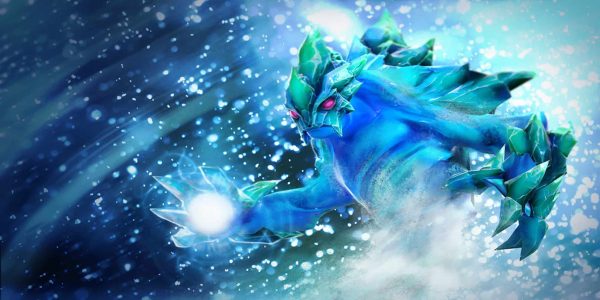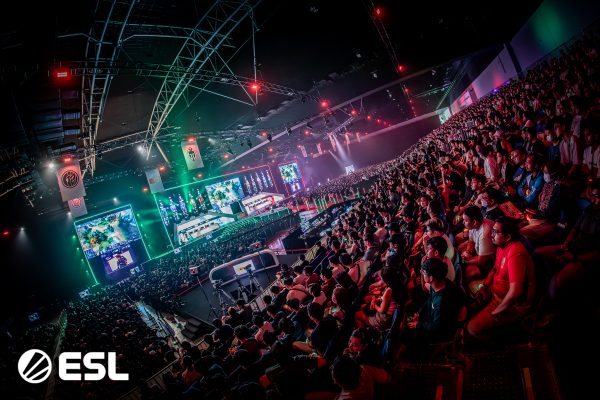When Arkosh Gaming broke into the North American scene a few months ago, few would have argued that they were anything but a good thing for the scene. With a compelling heavy metal style and an air of mystery, the team was the most interesting and compelling thing to happen to NA Dota since… well… since EG were TI champs. But now questions have arisen around the teams mystery players, and people are asking whether Arkosh Gaming are smurfing?
Are Arkosh Gaming Smurfing? The fact they hide their players real identities has created controversy (Photo courtesy Arkrosh Gaming)
With Arkosh Gaming making it into the lower division of the DPC, a new controversy has emerged: Is it fair for a team to hide the identity of its players in a competitive environment? Are the players of Arkosh Gaming exploiting a competitive advantage? On January 12th, as the team officially qualified for the Lower Division of the NA DPC. Criticism of their methods started to emerge immediately.
Is it Smurfing?
Smurfing is the practice of hiding your identity to play games. It’s usually defined as hiding your main account to get easier games and avoid queues. In theory, smurfing a tournament would constitute attempting to enter the event twice under different aliases. But it could also mean entering a lower-tier tournament with high-skill players. This way you’d face less proficient opponents.
So the question naturally arises: Is that what Arkosh are doing in the DPC? They play with hidden names, and you can’t search their match history outside of their (limited) pro games. Allegedly, only Valve, and their management knows their identity. So is it smurfing?
Presented as something to breathe life back into the NA Dota 2 scene, Arkosh Gaming is a lot like pro-wrestling. Each player has a gimmick, a somewhat consistent narrative backstory, and their real identity is hidden. But here’s the thing with wrestling: both competitors are in on the deception.
If the teams Arkosh defeated in the qualifiers didn’t know their real identities, that constitutes a competitive advantage. Outside of a few show matches, where Arkosh often picked their gimmick’s signature (such as Canis Lupus picking Lycan in several games), there is little to no “official” competitive data on them. This would mean squads including The Cut, Blue Pikachu, Team DogChamp, and the Portland Burnsiders had no idea who Arkosh’s players were. If so, then the qualifiers – some of which were best-of-one until the semifinals – were competatively compromised.
The Truth of it all
But here’s the thing: According to many in NA, there’s no way their opponents didn’t know who Arkosh’s players were. 4 Zoomers’ Samuel “Sammyboy” Anderson put it best on his stream:
https://clips.twitch.tv/BlightedBrainyCaribouPeoplesChamp
“The whole idea is theoretically not fair because you can’t figure out what they’re playing, but also it’s kind of fair because everyone knows who they are,” hey says. “I guarantee that every single team that has played versus them knows who’s on their roster.” In fact, this seems to be the consensus. The identities of Arkosh are all but officially confirmed in player and organizer circles. Everyone knows exactly who they’re playing.
The Verdict
In short, Arkosh Gaming isn’t smurfing the DPC. It’s all an illusion of the highest magnitude, where the only ones not in on the deception are the fans. In many ways this is the best way of doing things. To go back to the pro-wrestling analogy, the people in the match know the deception – It’s only the fans who are being ‘worked.’
But as with almost everything in Dota 2, the uproar and controversy that was sparked from this story doesn’t come from just one source. Instead, it’s likely a symptom of a greater disenchantment with the DPC and the way Valve has handled things. The glacial pace at which they reacted to things like the Newbee’s match fixing scandal which stewed for seven months after the initial allegations, and Jimmy “DeMoN” Ho’s ban have contributed to a lack of trust in the developer.
The Arkosh Gaming smurfing debate also taps into recent real issues in the Southeast Asian DPC qualifiers. After allegations of account sharing, Lower Division qualifiers Team Assault were disqualified and replaced by the Army Geniuses. With this going on in SEA, there’s no guarantee the same tricks can’t be pulled in NA. After all, even with their identities known, the Arkosh Gaming crew has added an additional level of secrecy. For them, account sharing would be even less detectable.
Conventional wisdom would suggest that if the alleged identities are true, it’s almost unthinkable that they’d risk their careers to account share. But couple this with new DPC format teething problems, and general lack of trust thanks to the radio silence for much of 2020 and Dota 2 esports fans and players likely don’t have much faith left in Valve.

